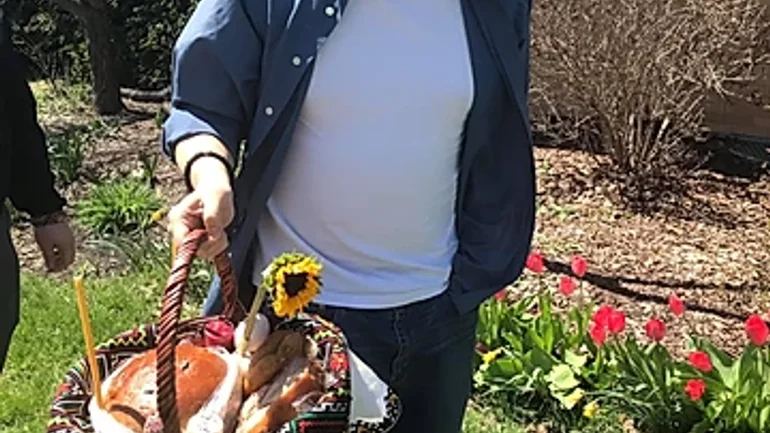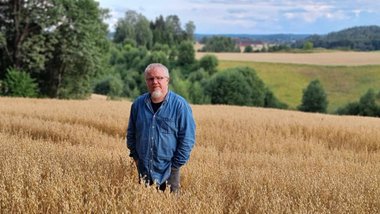Decolonizing The Global Ukrainian Church

 Saying that this Church is my home is often considered contentious, mostly because I am not an ethnic Ukrainian. This contention, I find, is equally raised by some within the church. However they want to read my body, I am in this church. Usually, my secular friends just find it interesting, as if it's one of my private quirks. But my Christian friends (whom I still consider to be my sisters and brothers, whether or not we are in formal communion) usually have the hardest time with it.
Saying that this Church is my home is often considered contentious, mostly because I am not an ethnic Ukrainian. This contention, I find, is equally raised by some within the church. However they want to read my body, I am in this church. Usually, my secular friends just find it interesting, as if it's one of my private quirks. But my Christian friends (whom I still consider to be my sisters and brothers, whether or not we are in formal communion) usually have the hardest time with it.
I find it very strange that other people are weirded out that I am in this church. Most people (and by 'people,' I do not refer to the folks who have been amazingly welcoming, but mostly those outside of it trying to figure me out) assume that this church is for Ukrainians. I am Cantonese, Asian American, anything but Ukrainian. Others assume that it is Roman Catholic with ethnic characteristics -- more of a celebration of 'culture' over cosmology (of course, Hawai'ians will tell you that that last kind of logic is a slippery slope indeed).
If someone joins a Christian church, it is not weird, for example, if someone becomes a Roman Catholic and is not Italian, or if someone becomes an evangelical Protestant and isn't white, or even if someone joins the Orthodox Church in America and isn't Russian or Greek. Someone outside this church recently told me that I should not refer to my people as 'my people' because I am Asian American and still read, if I were to be Christian, as a kind of evangelical.
As such, every so often, it's easy to feel a bit crazy, that maybe everybody else is right, that I'm a fraud in this church and that I should just accept that I'll never be religiously more than an Asian American evangelical. Consistently -- and I think this is God taking into account my spiritual immaturity, because I'm obviously still a child who needs these training wheels -- I get a reminder that I remain in this church whenever I start to give in to the gaslighting.
Today, that reminder came from a message from my Patriarch in Kyiv. His Beatitude had a message to share with those of us who belong to what has become known as the "Chinese parish of the Kyivan Church." He told my spiritual father that our Mother Church in Ukraine 'heartfully' holds us in her embrace, even though our homeland may not be the black soil of ancient Kyivan Rus'.

I teach a course called 'Finding Home in a Globalized World.' It's a pilot attempt for next year's 'big questions' courses, which revolve around the questions of the global and the local. Each faculty member approaches the big questions differently -- we are encouraged to do so. I require my students to integrate an account of their personal experience with the course material. Sometimes I share my experiences too, not in the sense that they have to learn it for regurgitation, but because I want to provide an example of how such integration might be done. I tell them that the worst thing for them to do is to find themselves in me. The objective of the course is for them to be conscious in their finding of home in a globalized world.

The Patriarch's words, to me, fall under the rubric of finding home in a globalized world. He's saying that though I have to live in a globalized world where my sense of belonging might feel all out of whack, I have a home in this church, a people to call family, a table where I can dine as one whose prayerful existence is a participation in the risen life of Jesus Christ.
In that global transformation -- a secular one, in the sense that the whole world, not just the structure of the church, was transforming -- the question has often arisen as to who this church is for. Is it only, for example, for Ukrainians? Practically speaking, and mostly due to colonial baggage, the answer to that question has been yes. The best of that tradition has been a deep meditation on the experience of colonization from the perspective of Ukrainians, including the artificial famine of the Holodomor (the 'hunger-death'), the liquidation of our church under Stalin's orders, the nuclear meltdown at Chornobyl, and the protests for dignity on the central square of Kyiv, known as the Maidan. But given that the church has been transformed through the secular conditions of globalization, the question has been whether people whose ethnicity is not Ukrainian can ever fully been part of this church.
Some have intimated no, that we who cannot trace our familial ties to the black soil of Kyivan Rus' will always only be guests at best. But in Kyiv, the Patriarch of our church answered today a definitive yes. It may be Vancouver. It may be Hong Kong. It may be anywhere else in the world, including where I am now. But in this globalized world, I know that this church is a home for me, where my life of personal prayer is socially housed.
It's a strange story how I was blown into this church. I was not unhappy with where I was before, and when I was formalizing my membership in it, my friend joked that it would take a geographer to figure me out. But received into I was. It's a church that most people I tell my story to find difficult to believe that I actually belong to -- and I have pictures, certificates, parish records, and notes from bishops all confirming my formal belonging.
It reminded me of what one of my dear brothers in this church once said to me when I confessed that I retain all the personal habits and bodily comportments that mark me as an Asian American evangelical, even as I participate in the mysterious prayer life of this Kyivan Church of ours.
"You are an Asian American evangelical in the Kyivan Church," he said, "and we always knew that and have never expected you to be anything else except for who you are."
Good word, thought I, for our Patriarch has also said elsewhere that not only should we only "be ourselves" as a church.
But if I'm going to offer a window into my personal life for the sake of postsecular communication, let's really get into what this church is. The short memories of the normatively protestant modern secular will be stretched, no doubt, as I say that our church was founded in 988. That's when the prince of Kyiv, Volodymyr, was baptized in the same baptism that his grandmother Olha was immersed years before in Constantinople. With Volodymyr baptized, so too were those who lived in the city of Kyiv. The Christian church founded in Kyiv used the imperial Byzantine liturgy from Constantinople -- or rather, adapted it over time for our own folk singing.

Eventually, the kingdom that that church was joined to, which was known as Kyivan Rus', fell to the Mongols (and later, Constantinople to the Ottomans), triggering all sorts of questions about which empire the church of Kyiv -- or, the 'Kyivan Church' -- should be joined to, if any at all. It's usually the more theologically insecure among us who seem to need an imperial strongman.
Our prayer tradition, however, centers on the integration of the intellect with the heart, which in our experience leads to a stillness where we encounter most transformatively energies of the God whose essence we can never fully grasp. Really, it's just a church for ordinary folks who, while having to live in a real world that is a game of thrones, are shown that, at an existential level, there might be more.
What this historical account of our church, which is most fully told by the scholars who composed the Kyivan Church Study Group in the 1990s, offers is an account of the Kyivan Church without much commitment to ethnicity. There's a case to be made that, because of the early demise of the empire that our church was attached to, we have had many struggles as to what our identity could possibly be because everybody else has tried to colonize us. But part of the point in my experience of this church of becoming conscious of our colonized consciousness is to realize, in the words of our Patriarch Sviatoslav in Kyiv, that we do not need anybody's permission except the Holy Spirit to exist.
Since the baptism of Kyiv, there have also been many changes to the world, including the nature of globalization. As what came to be called the secular world transformed, people, ideas, and objects moved, often globally, and what this has done not just to our church, but to many Christian churches, is to extend what used to be local urban phenomena into global networks. And so it is that the Kyivan Church, like every other Christian church in the modern world (I can't speak for religious traditions that aren't mine, but I will bet there are parallels), became a global church -- because the ordinary people who make up the church have to make lives for ourselves in a world interspersed by networks of globalization.
I also thank God, on this week after the Sunday of the Publican and the Pharisee, that I am not like other "convertidox," who grow beards and speak bad Russian, for the fact that I can still be mistaken for an Asian American evangelical means that I at least am not an Orthodox hipster.
To say that I was moved as I listened to our Patriarch is to understate the moment. It has now passed, and I am still savouring it. And as I do, I find that I am becoming still, like a weaned child within me. Like a weaned child with his mother am I, the Immovable Wall because of whose hands remain upraised the city will never be taken. Most Holy Theotokos, save us.
St. Mary of Egypt Social Justice Fellowship, February 13, 2020









